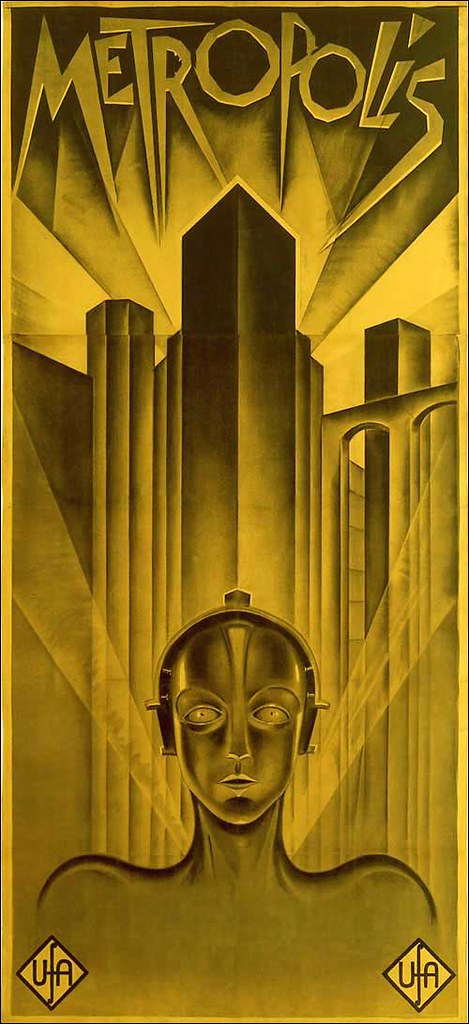
I knew I'd never seen Metropolis all the way through, but I thought I'd seen more of it than it turns out I had, so sitting and watching the "Complete" version with all the restored "lost" footage was a real treat. The number of films I could catch reference to here, feeling the impact backwards as it were, was pretty incredible. Several Spielberg films (Raiders of the Lost Ark, Temple of Doom, Close Encounters of the Third Kind), Lucas (THX-1138, Star Wars: A New Hope), Gilliam (Brazil most notably) and even more offbeat fare (The Hudsucker Proxy, Joe vs. the Volcano) all come to mind.
The metaphor and visual poetry throughout was pretty great. For one the (explicitly repeated) theme that "The Heart Must Be The Mediator Between The Head And The Hands" played out in pretty interesting ways, although the very end with Freder literally mediating between Head (his father, Joh Fredersen, the Master of Metropolis) and the Hands (the foreman Grot, the Master of the Heart Machine and the ad-hoc leader of the city's workers) was a bit too direct to resonate as much more than an easy way to resolve the characters' stories. Taking the "God" out of the Tower of Babel story and turning it into a stone-cold ideological metaphor of class was pretty cool, especially in the economical way it was handled with so few lines or scenes (the leaders and thinkers who come up with Babel think of the word as an exultation of their own and God's greatness; the workers hired to slave away and die for its construction see the same word not as cry of praise but as a curse of despair; therefore it is as though the men all spoke a different language and could not communicate with each other, and so the Tower of Babel was cursed to remain unfinished).
Actually -- and not surprisingly considering my obsessive focus of late (the reason I haven't been blogging is that I haven't been watching films; the main reason I haven't been watching films is that I've been pushing myself for eight to ten hours a night, writing) -- the way the film most impacted me is the way it threw some elements of my "end of the world romantic black comedy epic" script into sharp relief. The theme of Heart vs Hand vs Head is actually no small part of the story I'm working on, and the way the future is depicted here too is actually kind of relieving (that I could "reference Metropolis" in my depiction of rulers, thinkers, and workers somehow makes that seem at least a tiny bit less daunting -- especially the "rulers," which have been giving me a little trouble). Even the technology of throwing a lever and transferring the identity of Maria into the Machine-Man robot has a pretty clear parallel in the story I'm working on (though, at least right now, I have no intention of making the post-mad-scientist woman turn evil and maniacal).
I already know I'm going to be revisiting this soon for a beat-analysis and writing exercise, because I have a feeling considering the themes and approaches this film takes with its story may have an impact on the telling of my own. Maybe I'll have more insight then, beyond "It does things well, and the story feels similar to my own in unexpected ways." I will say this, though: even by today's standards most of the visual effects and sets look pretty amazing; by 1927 standards they must have blown people's socks off. And the use of film as a medium to tell a story that couldn't be told any other way -- the non-literal, the visual poetry and metaphor, the operatic drama combined with heady modern themes and huge, lush setpieces -- make me wonder about all the later, American films by Fritz Lang I've seen over the years. Did I miss something? They struck me as gorgeous, and well-told, and well-acted and directed, but I don't remember any of the kind of boldness of storytelling that you find here in Scarlet Street or The Big Heat or The Woman in the Window.
Wonderful film, deserving of every bit of its reputation.

No comments:
Post a Comment